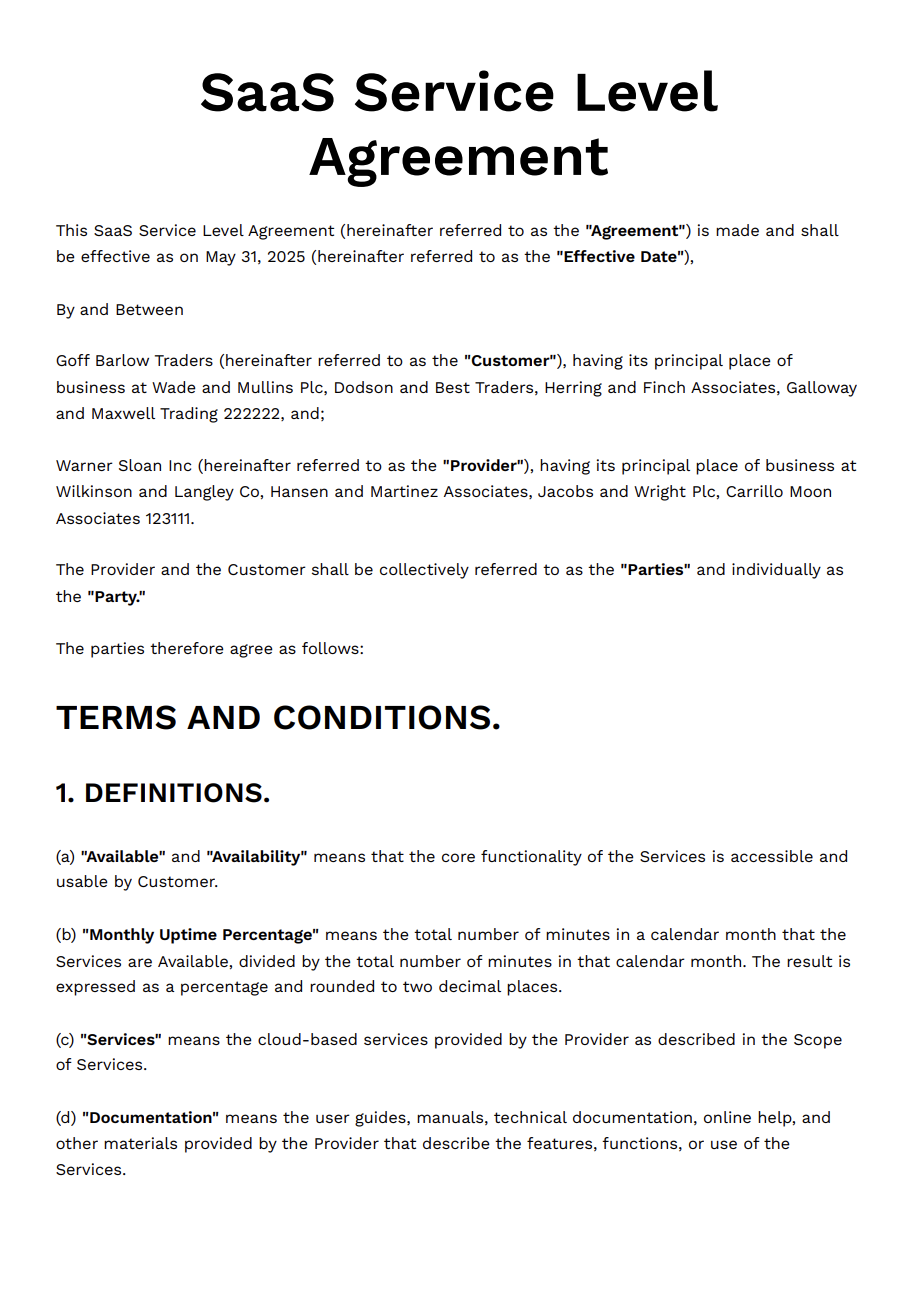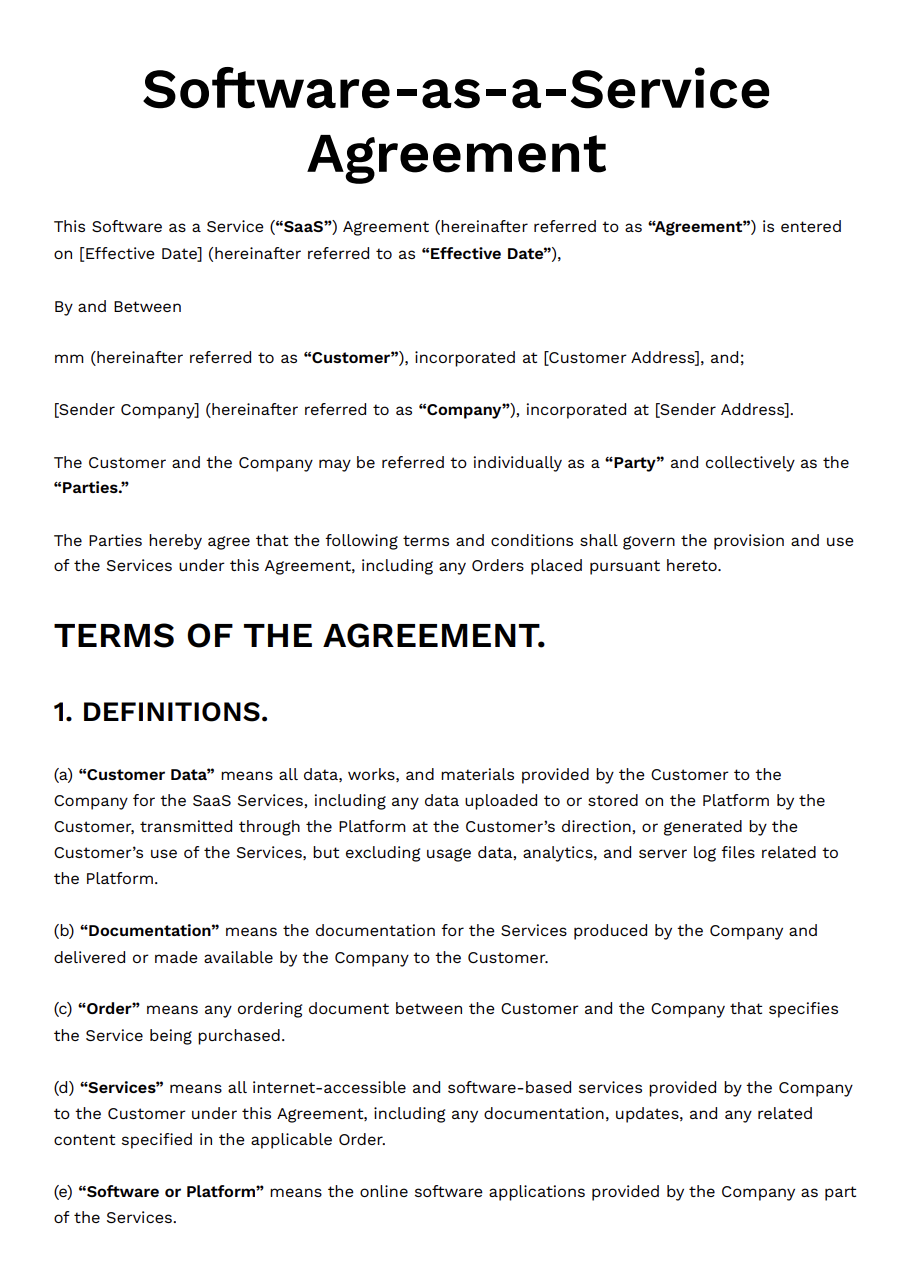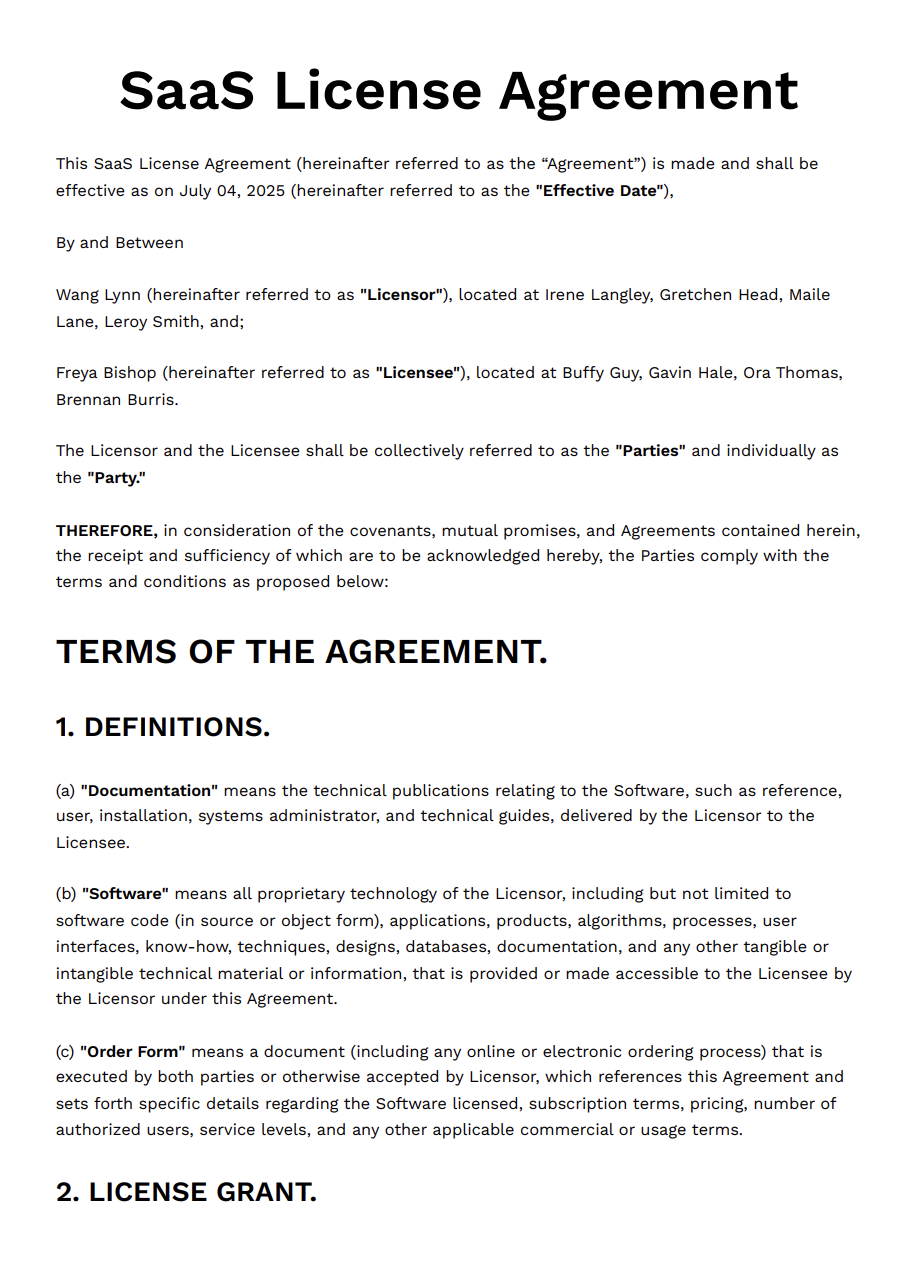Preview the template:
White Label SaaS Agreement: how-to guide
According to research by Gartner, technology companies adopting white-label models are projected to achieve an average annual growth rate of 38% by 2025.
IBM's experience with white-label agreements shows that including such clauses led to a 39% reduction in litigation and a fourfold increase in settlement efficiency.
The white-label SaaS model has emerged as a strategic choice for companies looking to rapidly expand their product offerings.
What is a White Label SaaS Agreement?
A White Label SaaS Agreement is a legal contract between a software provider and a reseller. It gives the reseller the right to rebrand and offer the software as if it were their own product.
The agreement clearly defines the license to use the software, the roles and responsibilities of each party, how revenue will be shared, and what rules must be followed. Its main purpose is to protect both sides and make sure they understand their rights and obligations in the partnership.
What Are the essential components of a white label SaaS agreement?
- Definitions and Scope: Clarifies key terms and what parts of the software can be rebranded or resold.
- License Grant: Describes what the reseller is allowed to do with the software, such as customize or sublicense it.
- Branding and Customization: Outlines how the reseller can change the appearance of the product, such as logos and domain names.
- Roles and Responsibilities: Specifies what each party must do, including sales, support, and maintenance tasks.
- Data Ownership and Privacy: States who owns the user data and how it must be handled and protected.
- Intellectual Property Rights: Confirms who owns the core software and any customizations.
- Limitation of Liability: Sets limits on legal and financial responsibility for both sides.
- Termination and Renewal: Explains how the agreement can be ended or extended.
- Dispute Resolution: Describes how any legal issues will be handled, including the process and location.
What Advantages Does a White Label SaaS Agreement Provide to SaaS Providers?
A White Label SaaS agreement offers several benefits for software providers:
- Expanded Market Reach: Resellers promote and sell the product under their own brand, helping the provider reach new customers without extra marketing costs.
- Increased Revenue Streams: Providers earn through licensing fees or revenue sharing, adding predictable income from multiple sources.
- Faster Growth with Lower Risk: Resellers handle branding, customer relationships, and support, allowing the provider to scale faster with less direct effort.
- Focus on Core Development: Providers can concentrate on improving the software while partners manage sales and customer service.
- Stronger Legal Protection: The agreement clearly defines roles, limits liability, and protects intellectual property, reducing the risk of disputes.
How Does a White Label SaaS Agreement Benefit Resellers?
Resellers gain several advantages through a White Label SaaS agreement:
- Faster Time to Market: They can launch a ready-made product without building it from scratch.
- Brand Ownership: They can offer the product under their own brand, building recognition and customer loyalty.
- Revenue Opportunities: Resellers can set their own pricing and earn from subscriptions or service bundles.
- Lower Development Costs: Using an existing platform avoids the time and expense of software development.
- Ongoing Support: The provider often handles backend updates and maintenance, reducing technical burdens.
Why Is Data Privacy Important in a White Label SaaS Agreement?
Data privacy is critical in a White Label SaaS agreement because resellers often collect and manage customer data through the software. Clear terms are needed to define who owns the data, who is responsible for its security, and how it must be handled. This helps avoid legal risks, builds trust with end users, and ensures compliance with privacy laws such as GDPR or CCPA.
What Legal Considerations Should Be Addressed When Drafting a White Label SaaS Agreement?
Important legal considerations include:
- Intellectual Property Ownership: Clearly define who owns the core software, branding elements, and any custom features.
- Compliance with Industry Laws: Ensure the agreement meets any sector-specific regulations, such as HIPAA for healthcare or GDPR for data protection.
- Liability and Indemnification: Set limits on legal responsibility and include clauses that protect each party from third-party claims.
- Termination Conditions: Outline when and how the agreement can be ended, and what happens to customer data and access rights afterward.
- Dispute Resolution: Include a clear process for handling conflicts, such as requiring arbitration to reduce the cost and time of legal disputes.
White Label SaaS Agreement Template
Use a white label SaaS agreement template to allowing the reseller to rebrand and sell the provider's software as their own.
Edit Template OnlineStart creating at $14/month or $108/year for unlimited documents
No sign-up required
Fill your responses and complete your document
Maintained regularly
FAQs
Does the agreement cover intellectual property rights?
Yes. It clearly states that the SaaS provider retains ownership of the underlying software and IP.
How often do you update this template?
We update our templates regularly to reflect changes in laws and best practices. The last update was in May 2025.
Does this template cover third-party branding and customer support?
Yes. This template define the scope of branding, customer ownership, and support responsibilities between the provider and the reseller.
Is this template suitable for white-label SaaS products?
Yes. This version includes specific clauses for reselling and rebranding, which are common in white-label SaaS models.


